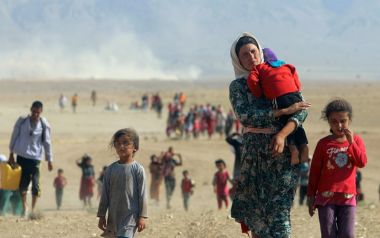Islamic State's 'theology of rape' used to justify systematic abuse

Islamic State has developed a "theology of rape" which it uses to justify the sexual slavery of Yazidi women, according to a New York Times investigation.
The analysis by Rukmini Callimachi describes the systematic sexual exploitation of captured women and children. Islamic State fighters are told that Islam permits them to rape unbelievers, and the group's revival of the institution of slavery since its onslaught on the Yazidis last year has provided them with a ready supply of victims.
One 12-year-old girl testified that her attacker prayed before and after each assault. "He told me that according to Islam he is allowed to rape an unbeliever. He said that by raping me, he is drawing closer to God," she said.
A total of 5,270 Yazidis were abducted last year and at least 3,144 are still being held. Women are bought and sold, with sales contracts notarised by Islamic courts.
According to the NYT, "Repeatedly, the ISIS leadership has emphasized a narrow and selective reading of the Quran and other religious rulings to not only justify violence, but also to elevate and celebrate each sexual assault as spiritually beneficial, even virtuous."
A 15-year-old girl testified that she was driven with 24 other girls and young women to an army base in Iraq and told that she was now a "sabaya" or slave.
The local Islamic State leader "told us that Taus Malik" — one of seven angels to whom the Yazidis pray — "is not God. He said that Taus Malik is the devil and that because you worship the devil, you belong to us. We can sell you and use you as we see fit."
So far, only the Yazidis, regarded as polytheists rather than 'people of the Book', have been targeted for sexual slavery. Only women who are already pregnant are off-limits, according to shariah law. Slaves can be willed to another man like any other property after a fighter's death, or sold, or even set free.
The article describes one 25-year-old victim who escaped last month, who said that one day her Libyan master had explained that he had finished his training as a suicide bomber and was planning to blow himself up, and was therefore setting her free. He handed her a laminated "Certificate of Emancipation" which she used to pass through security checkpoints and was reunited with her family.
The plight of the Yazidis, around 40,000 of whom were trapped on the isolated Mount Sinjar for five months until December last year after the Islamic State onslaught, drew world-wide condemnation. Air strikes and the dropping of relief supplies, together with the success of Kurdish fighters, enabled the "siege" to be lifted.











